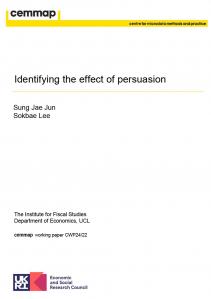Working Paper
In a randomized control trial, the precision of an average treatment effect estimator and the power of the corresponding t-test can be improved either by collecting data on additional individuals, or by collecting additional covariates that predict the outcome variable. To design the experiment, a researcher needs to solve this tradeoff subject to her budget constraint. We show that this optimization problem is equivalent to optimally predicting outcomes by the covariates, which in turn can be solved using existing machine learning techniques using pre-experimental data such as other similar studies, a census, or a household survey. In two empirical applications, we show that our procedure can lead to reductions of up to 58% in the costs of data collection, or improvements of the same magnitude in the precision of the treatment effect estimator.







































